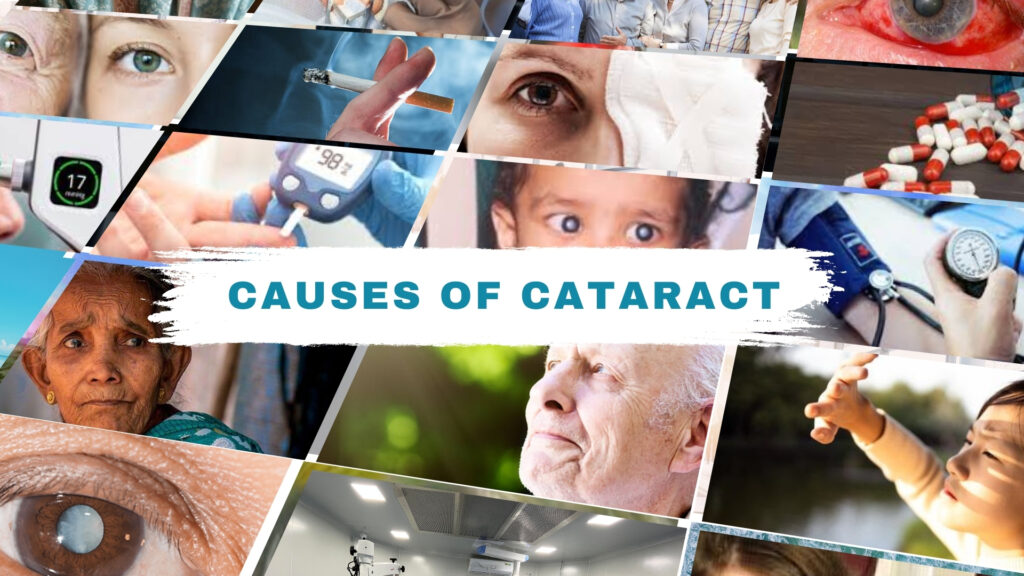Causes of Cataract and How to Delay Its Progression
Cataracts Cataracts are a common eye condition, especially as we age, leading to cloudy or blurry vision. Although age-related cataracts are inevitable for many, they don’t progress at the same rate for everyone. Just like the way our hair turns white as we age, cataracts form at different stages depending on various factors. In this post, we’ll explore the causes of cataracts and practical tips to delay their progression, particularly focusing on age-related cataracts. What Causes Cataracts? Age The natural aging process is the leading cause, typically affecting people over 60. Genetics A family history of cataracts may increase your likelihood of developing them earlier. Health Conditions Diabetes, hypertension, and other medical conditions can accelerate cataract formation. Sun Exposure Prolonged exposure to UV rays can damage the lens, hastening cataract development. Smoking and Alcohol These lifestyle habits increase oxidative stress, contributing to cataract formation. Eye Injuries or Surgeries Trauma or previous surgeries to the eye can lead to cataracts over time. The Analogy: Aging and Cataracts, Like White Hair Just as aging causes some people to get white hair earlier than others, cataracts also progress at different rates for different people. Some individuals may notice white hair in their 30s, while others won’t experience it until much later in life. Similarly, cataracts can develop earlier in some due to lifestyle, genetics, or health conditions, while others may maintain clear vision into their 60s or 70s. The key is recognizing the risk factors and taking steps to delay the progression, much like how some people try to maintain healthy hair by managing stress, diet, and overall health. How to Delay Cataract Progression Wear UV Protection Long-term exposure to the sun’s harmful UV rays accelerates cataract development. Wear sunglasses with UV protection when outdoors to shield your eyes from damage. Call +91-8074661750 Eat an Antioxidant-Rich Diet A diet rich in antioxidants such as Vitamin C, Vitamin E, and beta-carotene can help slow the progression of cataracts by protecting your eyes from oxidative damage. Incorporate leafy greens, citrus fruits, carrots, and nuts into your daily meals. Quit Smoking and Limit Alcohol Smoking and excessive alcohol consumption increase the production of free radicals, which can harm the lens. Quitting smoking and limiting alcohol intake can reduce your risk of early cataract development Whatsapp Icon-email Instagram Youtube Icon-map-marker1 Manage Health Conditions Chronic conditions like diabetes are known to accelerate cataract formation. Keeping blood sugar and blood pressure under control can help delay cataract progression. Regular Eye Exams Routine eye check-ups are crucial, especially after the age of 40. Early detection can help monitor cataracts and take preventive measures to slow their development. Why Choose Dr. Shanthi Niketh and Shanthi Nethralaya Eye Hospital for Cataract Surgery? At Shanthi Nethralaya Eye Hospital, Dr. Shanthi Niketh is recognized as Hyderabad’s best eye surgeon, specializing in advanced cataract surgery. With years of expertise and a patient-centered approach, Dr. B.Shanthi Niketh ensures that every patient receives personalized care and the latest surgical techniques for optimal vision outcomes. Our state-of-the-art facilities, combined with compassionate care, make Shanthi Nethralaya the best choice for cataract surgery Conclusion: Take Charge of Your Eye Health While aging is an inevitable factor in cataract formation, proactive steps can delay its progression. By protecting your eyes and maintaining overall health, you can enjoy clearer vision for longer. And when the time comes for cataract surgery, trust Dr. Shanthi Niketh and Shanthi Nethralaya Eye Hospital to provide world-class care and exceptional results.



